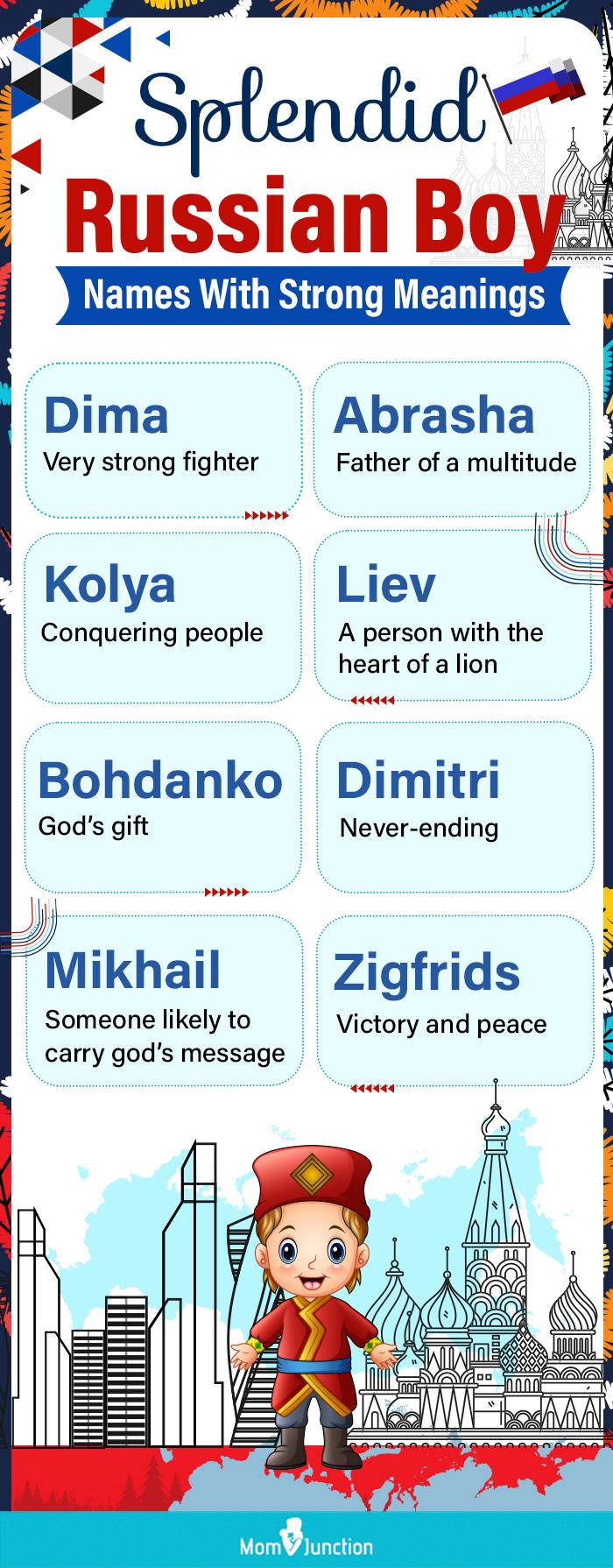Russian names for guys carry a rich cultural heritage and distinct characteristics that reflect the history and tradition of Russia. In this article, we will delve into the intricacies of Russian male names, exploring their meanings, origins, and how they are structured. Knowing Russian names can enhance your understanding of Russian culture and may even be useful if you are traveling or working in a Russian-speaking environment.
From Ivan to Dmitry, the variety of names found in Russia can be both fascinating and overwhelming. This guide aims to provide clarity on the topic, offering insights into popular names, naming conventions, and the significance behind them. Furthermore, we will also touch upon how names can reflect social and familial ties in Russian society.
Whether you are interested in naming your child, researching Russian culture, or simply curious about the significance of names, this article serves as your go-to resource. Join us as we unpack the world of Russian names for guys and uncover the stories behind them.
- The Life And Legacy Of Lynne Marta A Comprehensive Biography
- Understanding The Chinese Zodiac What Does 1976 Represent
Table of Contents
- Introduction
- Biography of Russian Names
- Popular Russian Names for Guys
- Structure of Russian Names
- Cultural Significance of Names
- Historical Context of Russian Male Names
- Modern Trends in Russian Naming
- Conclusion
Biography of Russian Names
Russian names have a deep historical context, often rooted in the Slavic language and influenced by various cultures over the centuries. Traditionally, a Russian male name consists of three parts: the first name, the patronymic (derived from the father's name), and the surname. This naming convention highlights the importance of family lineage and connections in Russian society.
| Name | Origin | Meaning |
|---|---|---|
| Ivan | Hebrew | God is gracious |
| Dmitry | Greek | Follower of Demeter |
| Alexei | Greek | Defender |
| Vladimir | Slavic | Ruler of the world |
Popular Russian Names for Guys
Many Russian names have stood the test of time, remaining popular across generations. Here, we discuss some of the most common Russian male names and their meanings:
- Ivan: A traditional name meaning 'God is gracious'.
- Dmitry: Meaning 'follower of Demeter', this name is often associated with strength.
- Alexei: A name that signifies 'defender', commonly used in modern Russia.
- Vladimir: Meaning 'ruler of the world', this name has historical significance.
- Sergei: Often associated with the Roman family, meaning 'protector'.
Structure of Russian Names
The structure of Russian names is unique and essential for understanding their significance. As mentioned earlier, a Russian male name typically consists of three components:
- Sidney Powell Ohio A Deep Dive Into Her Legal Battle And Its Implications
- Laura Wasser The Preeminent Attorney In Family Law
1. First Name
The first name is the individual's personal name, chosen by the parents. It often has cultural or familial significance.
2. Patronymic
The patronymic is derived from the father's first name, usually by adding suffixes like '-ovich' or '-evich' for sons. For example, if a father's name is Ivan, the patronymic for a son would be Ivanovich.
3. Surname
Finally, the surname indicates the family lineage and can reveal information about the geographic or ethnic background of the family.
Cultural Significance of Names
Names in Russia are more than just identifiers; they carry cultural significance and reflect societal values. Here are a few key points regarding the cultural importance of names:
- Names can denote social status, with certain names being more prestigious than others.
- Many families have naming traditions that require children to be named after relatives.
- Russian Orthodox traditions influence naming, as many names are derived from saints.
Historical Context of Russian Male Names
Understanding Russian male names also involves exploring their historical context. Many names have roots that trace back to ancient Slavic traditions or even earlier civilizations.
During the Tsarist era, names like Peter and Catherine became prominent, while the Soviet period introduced names like Leonid and Nikita. This evolution reflects the changing political and social landscapes of Russia.
Modern Trends in Russian Naming
In contemporary Russia, naming trends have shifted, with many parents opting for more modern and global names. However, traditional names still hold a significant place in society. Some current trends include:
- A resurgence of ancient Slavic names.
- Adoption of Western names, particularly among younger generations.
- Creative spellings and variations of traditional names.
Conclusion
In conclusion, Russian names for guys are not just labels; they embody history, culture, and family ties. Understanding these names enhances our appreciation of Russian society and its traditions. As we have explored, names like Ivan and Dmitry carry meanings that reflect both personal and cultural identities. If you are interested in Russian culture or considering a name for your child, we encourage you to explore the beautiful world of Russian names further.
We invite you to share your thoughts by leaving a comment below or sharing this article with others who might find it interesting. For more insights into Russian culture and names, feel free to explore our other articles!
Thank you for reading, and we hope to see you back on our site soon!
- Lady Margarita Armstrongjones A Glimpse Into The Life Of An Aristocrat
- The Dutton Family Tree A Deep Dive Into Their Legacy


